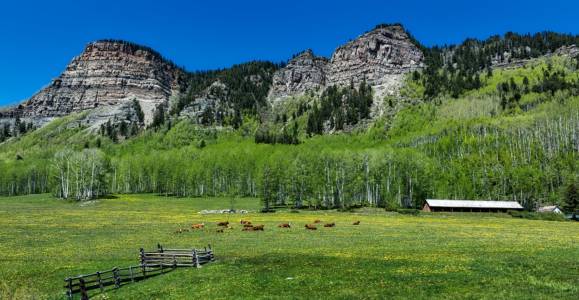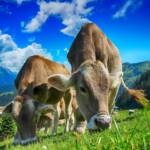By Joyce Lisbin

Image: Pixabay
Methane is a powerful greenhouse gas that is warming the planet and stays in the atmosphere for about 12 years. While CO2 maintains a presence in the atmosphere for centuries or longer, methane warms the planet for a decade or two before converting into CO2. In those short decades, methane warms the planet by 86 times as much as CO2, according to the Intergovernmental Panel on Climate Change. (Scientific American) Recent reports from the Intergovernmental Panel on Climate Change (IPCC) suggest that methane’s impact on global warming might be twice as powerful than previously thought.
As we work to address climate change, methane reduction is definitely a high priority. While we continue to work on keeping fossil fuels in the ground and addressing oil and gas’s role in methane emissions, another place to make change could be in our proverbial Colorado backyard because a significant source of this gas is cattle.
According to UC Davis, cattle are the number one source of agricultural greenhouse gas emissions worldwide. Each year, a single cow will belch about 220 pounds of methane. Livestock production—primarily cows—produce 14.5 percent of global greenhouse gas emissions. The majority of that is in the form of methane. Cattle not only belch methane, it is also released from their manure. According to the State Agriculture Overview, Colorado is home to 2,650,000 cattle including calves. That is a lot of cattle and a lot of methane.
Scientists have found a surprising method of reducing methane emissions in cattle: change the diet to include seaweed.

(Image: Pixabay)
Thankfully scientists have found a surprising method of reducing methane by changing the diet of cattle. “A bit of seaweed in cattle feed could reduce methane emissions from beef cattle as much as 82 percent,” according to new findings from researchers at the University of California, Davis. Cattle that consumed doses of about 80 grams (3 ounces) of seaweed gained as much weight as their herd mates while burping out 82 percent less methane into the atmosphere. The seaweed inhibits an enzyme in the cow’s digestive system that contributes to methane production.
“There is a creative solution to every problem.” – Deepak Chopra
Tremendous progress in developing and patenting a seaweed product, Brominata, has been made by the Blue Ocean Barns in California. The successful introduction of seaweed into the diet of dairy cows has not compromised the taste of products and reduced methane release.
It is hoped that this tidbit of information will arouse the curiosity of members of Colorado’s concerned agriculture community and beyond.
Want to get involved and support agricultural methane reduction?
- Have ideas on how we can support creative solutions in Colorado? To continue the exploration of reducing methane produced by cattle, contact Elysa@350colorado.org, Promoting Solutions Director and Regenerative Ag Committee Lead.
- Join the next Regenerative Agriculture Committee meeting! The committee meets monthly on the first Tuesday at 6:30. Find the next meeting on our calendar here.
Want to learn more? Check out the following articles:
